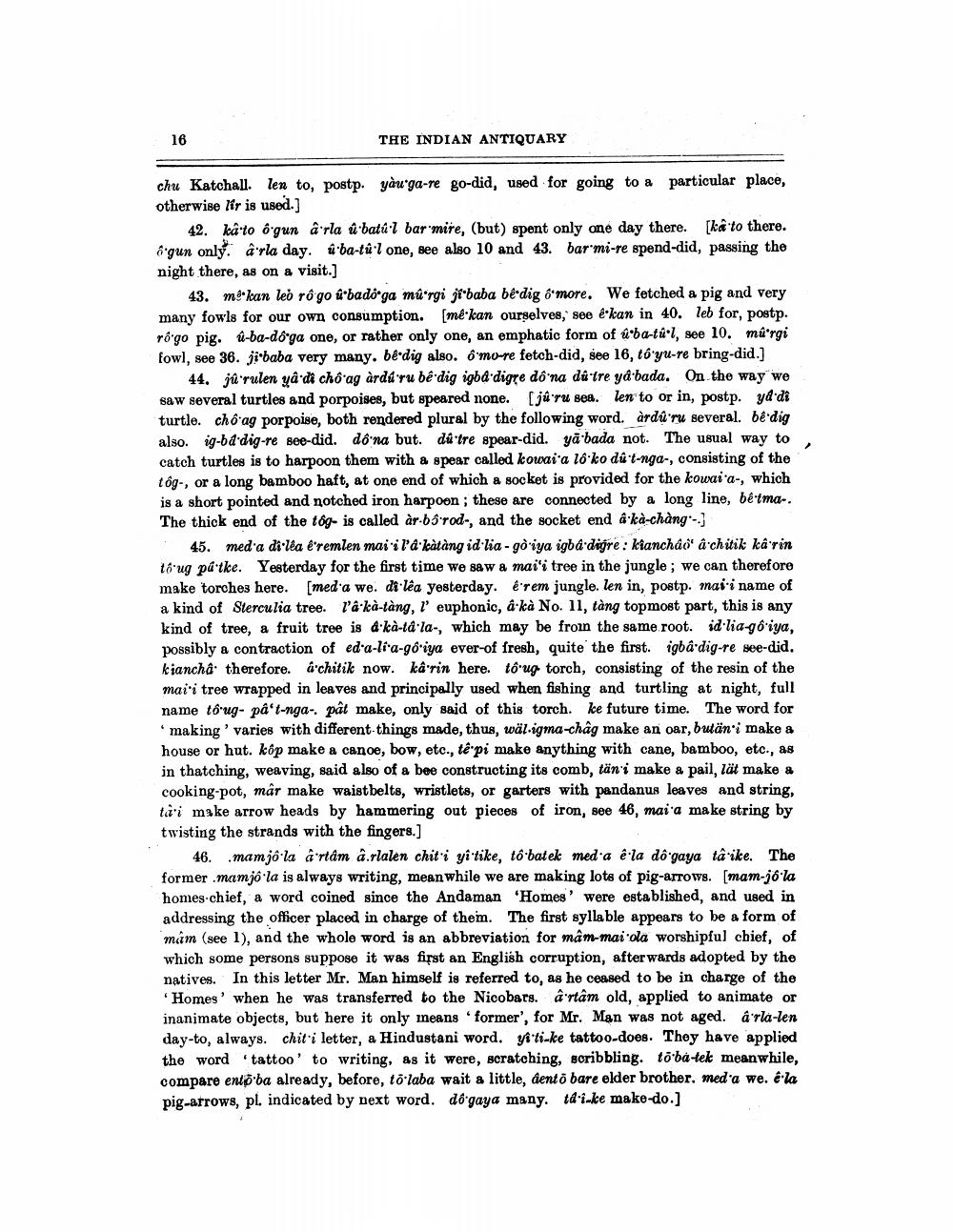________________
16
THE INDIAN ANTIQUARY
chu Katchall. len to, postp. yàu'ga-re go-did, used for going to a particular place, otherwise lír is used.]
42. kato ogun â'rla û batul bar mire, (but) spent only one day there. [ka to there. agun only. â'rla day. ûba-tûl one, see also 10 and 43. bar mi-re spend-did, passing the night there, as on a visit.]
43. me kan leò rô go û bado ga murgi jibaba bê dig o'more. We fetched a pig and very many fowls for our own consumption. [mê kan ourselves, see êkan in 40. leb for, postp. rogo pig. û-ba-do'ga one, or rather only one, an emphatic form of ûba-tûl, see 10. mürgi fowl, see 36. ji baba very many. bê'dig also. ômo-re fetch-did, see 16, toyu-re bring-did.]
44. jûrulen yâ di chô ag àrdúru bê dig igba digre dô'na dûtre ya bada. On the way we saw several turtles and porpoises, but speared none. [júru sea. len to or in, postp. yd di turtle. chô'ag porpoise, both rendered plural by the following word. àrdû ru several. bê dig also. ig-bd'dig-re see-did. dona but. dû tre spear-did. ya bada not. The usual way to catch turtles is to harpoon them with a spear called kowai'a lô ko dût-nga-, consisting of the tôg-, or a long bamboo haft, at one end of which a socket is provided for the kowai'a-, which is a short pointed and notched iron harpoon; these are connected by a long line, bêtma-. The thick end of the tôg- is called àr-b5rod-, and the socket end â kà-chàng-.]
45. meda dilêa é'remlen mai i l'â'kàtàng id·lia - gò'iya igbâ digre: kanchâo â chitik kârin to ug partke. Yesterday for the first time we saw a mai'i tree in the jungle; we can therefore make torches here. [med a we. dilêa yesterday. érem jungle. len in, postp. mai'i name of a kind of Sterculia tree. l'a kà-tàng, l' euphonic, â kà No. 11, tàng topmost part, this is any kind of tree, a fruit tree is d'kà-ta-la-, which may be froin the same root. id lia-go iya, possibly a contraction of ed'a-lia-gô'iya ever-of fresh, quite the first. igbâ dig-re see-did. kianchâ therefore. a'chitik now. kârin here. tôug torch, consisting of the resin of the mai'i tree wrapped in leaves and principally used when fishing and turtling at night, full name toug- pâ't-nga-. pât make, only said of this torch. ke future time. The word for 'making' varies with different things made, thus, wäl-igma-châg make an oar, butän'i make a house or hut. kôp make a canoe, bow, etc., tê'pi make anything with cane, bamboo, etc., as in thatching, weaving, said also of a bee constructing its comb, tän i make a pail, lät make a cooking-pot, mâr make waistbelts, wristlets, or garters with pandanus leaves and string, tai make arrow heads by hammering out pieces of iron, see 46, mai a make string by twisting the strands with the fingers.]
46. mamjo la artâm â.rlalen chiti yitike, tô batek med a êla do gaya tarike. The former mamjô la is always writing, meanwhile we are making lots of pig-arrows. [mam-jóla homes-chief, a word coined since the Andaman 'Homes' were established, and used in addressing the officer placed in charge of them. The first syllable appears to be a form of mam (see 1), and the whole word is an abbreviation for mâm-maiola worshipful chief, of which some persons suppose it was first an English corruption, afterwards adopted by the natives. In this letter Mr. Man himself is referred to, as he ceased to be in charge of the 'Homes' when he was transferred to the Nicobars. â'rtâm old, applied to animate or inanimate objects, but here it only means former', for Mr. Man was not aged. â'rla-len day-to, always. chit i letter, a Hindustani word. yiti-ke tattoo-does. They have applied the word tattoo' to writing, as it were, scratching, scribbling. to ba-tek meanwhile, compare ento ba already, before, to laba wait a little, âento bare elder brother. med a we. ê'la pig-arrows, pl. indicated by next word. do gaya many. tai-ke make-do.]




